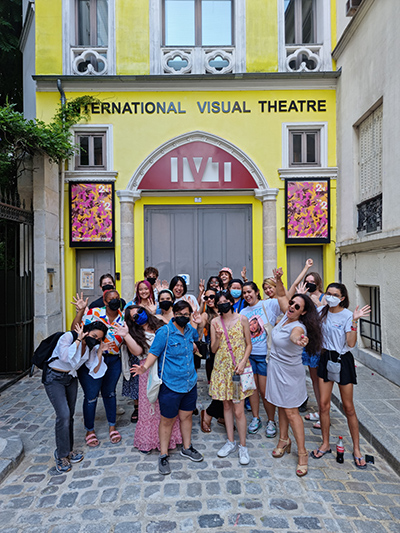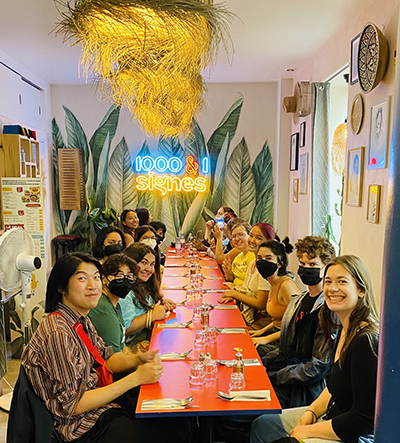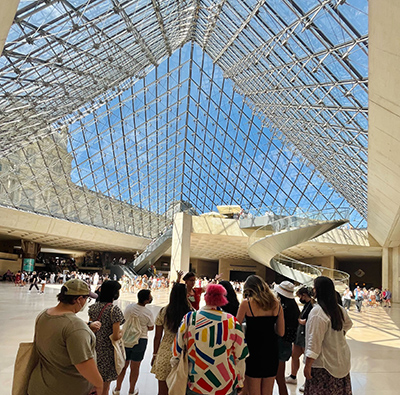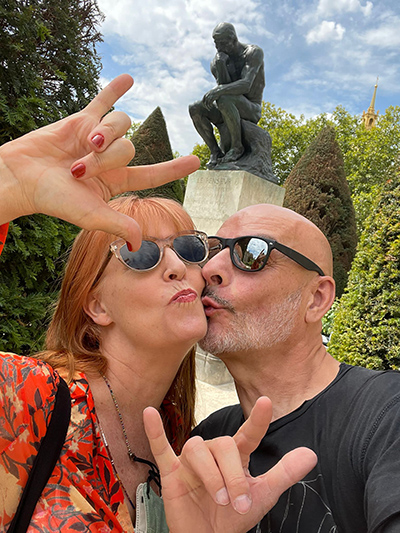Signing in the City of Light
Students explore sign languages, linguistics and Deaf history in 'Sign Language Studies in Paris' Global Seminar study abroad program
Published Date
Story by:
Media contact:
Topics covered:
Share This:
Article Content
Flying to France to study American Sign Language (ASL) might seem strange at first glance. But, says Peggy Lott, setting a UC San Diego Global Seminar in sign language studies in Paris was far from random.
Lott, the academic coordinator for ASL in the Linguistics Language Program at UC San Diego and a continuing lecturer in the Department of Linguistics, explained that ASL and French sign language, or la langue des signes française (LSF), are much more closely related to each other than ASL is to English. Lott, who uses she/they pronouns, said this is largely because of Thomas Gallaudet, a 19th-century American minister who voyaged to Europe to learn how best to educate Deaf children. He returned to Connecticut with Deaf educator and LSF signer Laurent Clerc, where the pair established in 1817 the nation’s first school for the Deaf.
“In addition to Martha's Vineyard Sign Language and varieties of North American Indian Sign Languages, LSF had a big impact on the evolution of ASL,” Lott said. “I wanted to create a program that highlighted their shared roots and gave students the chance to practice signing with French Deaf people.”

Lott had the opportunity to see LSF up close when she lived in France and taught at the Deaf school in Paris for five months before starting grad school. Wanting to give students a similar impactful experience to her own, Lott first offered the Sign Language Studies in Paris Global Seminar in 2019. After a forced hiatus from the pandemic, the seminar returned in 2022 and threw 18 students into the study of sign languages, Deaf culture and the sights and smells of “The City of Light.”
Lott and the students spent five weeks in France visiting key sites from Deaf history and diving deep into the historical roots of ASL and LSF, as well as learning to sign basic LSF. They visited L'Institut National de Jeunes Sourds de Paris (the National Institute for Deaf Youth in Paris), toured the International Visual Theatre and attended a show created and performed by the IVT troupe and enjoyed an outdoor lecture by IVT artist Simon Attia in one of Paris’ favorite parks, le jardin du Luxembourg, or the famed Luxembourg Gardens.
Students quickly noticed a key difference between how LSF signers and ASL signers react when they don’t have a ready sign: LSF relies much more on iconicity, or the resemblance between a sign and what it attempts to convey. LSF signers are more likely to create iconic signs on the spot, whereas ASL signers often rely on fingerspelling of new or technical terms to get their point across.
“Learning LSF has definitely affected my ASL signing,” said Koes Koes, a linguistics and math major who uses she/they pronouns and attended the global seminar in 2022. “My professors can attest to that, especially with how many LSF signs I’ve started using in my ASL classes!”
“I highly recommend students enroll if they have even a passing interest in linguistics, ASL or Deaf culture."

Koes was drawn to the program because it was a chance to brush up on their ASL skills, practice French (their second language) and be surrounded by Deaf culture with historic Paris as a backdrop. Still, their favorite part of the trip was a weekend spent 100 miles outside Paris.
“We attended the Clin d'Œil Festival in Reims near the beginning of our time abroad,” Koes explained. “Not only was the experience of meeting and interacting with various Deaf individuals from around the world a great experience, but Reims itself was a gorgeous city.”
Third-year student Haley Pritchard, who uses they/he/she pronouns, echoed Koes’ sentiments. At Clin d'Œil, Pritchard saw performances of Deaf theater in five different languages: LSF with French subtitles, Danish Sign Language, spoken Danish, Norwegian Sign Language, and Visual Vernacular (VV), an artform where actors express scenes visually in a way that anyone can understand.

“VV performance is very popular in Europe,” Lott explained. “It doesn’t use any particular signs from certain languages and instead uses the visual aspects of sign language—everything except for sign and fingerspelling—to tell the story.”
Pritchard shared that one of the most challenging but rewarding aspects of the global seminar was getting to sign with his peers face-to-face and in real time rather than over Zoom or video. He quickly found that daily trips on the Parisian metro were the perfect practice environment.
“Sometimes, it was too loud to hear each other or we were too far away from each other to talk,” Pritchard said. “By the end of the trip, we reached a point where we could communicate how many stops we had before getting off or other information simply by signing. There was a real thrill in successfully getting a message across in LSF.”
Those without any prior knowledge of sign languages are encouraged to join the global seminar, Lott said, adding that about half of the students in 2022 traveled having had no previous exposure to sign languages. Before going on the Global Seminar, students may not realize that sign language can fulfill every possible linguistic need of a human being, Lott explained.

For students interested in ASL, UC San Diego’s Linguistics Department offers a minor in ASL, of which the global seminar will fill two of the requirements. Students have the option to follow up to five quarters of ASL instruction and can move on to more advanced courses such as “Sociolinguistics in Deaf Communities,” “Discourse Analysis: ASL Poetry and Performance” and “The Psycholinguistics of Gesture and Sign Languages” after three ASL courses.
“I highly recommend students enroll in the Global Seminar if they have even a passing interest in linguistics, ASL or Deaf culture,” said Lott.
Students from any college or university can apply for Global Seminars through the end of February with applications accepted on a rolling basis. “It’s a really unique program in that while it is a study abroad program focused on language, it's not focused on learning the dominant language of the country we visit.”
Koes and Pritchard both agree. Their advice for prospective students?
“Explore and experience the culture surrounding you for yourself!” Koes said. “Paris is known for its cuisine. Its brasseries and cafés are built around the Parisian pastime of people-watching, so be sure to sit down for a one-to-two hour lunch sometime and just enjoy yourself.”
Still, at its heart, the global seminar is about language after all. Pritchard recommends students don’t take themselves too seriously — learning a new language is awkward!
“Don’t be afraid to try and to practice,” they said. “You're going to feel a little nervous or embarrassed, but everyone else around you is on your team.”
You May Also Like
Stay in the Know
Keep up with all the latest from UC San Diego. Subscribe to the newsletter today.




